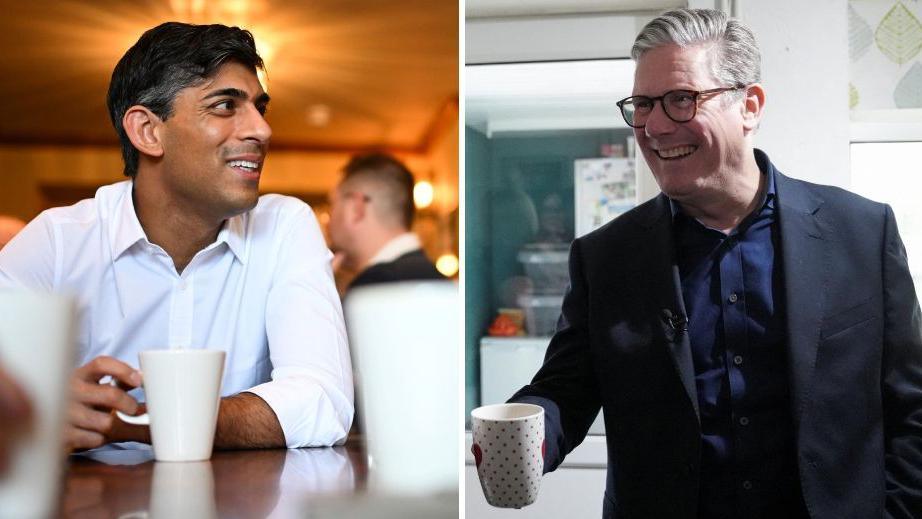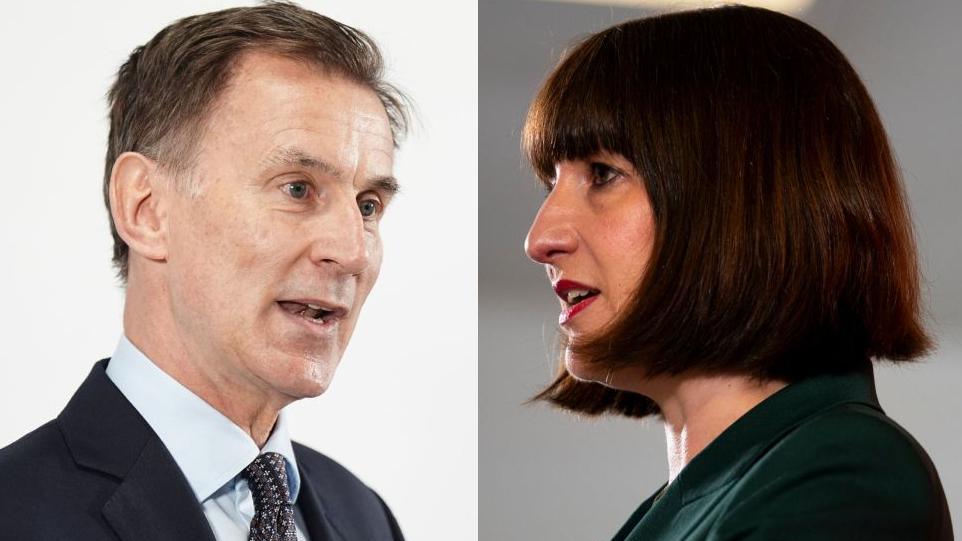Election skirmishes over tax and workers' rights

- Published
The Conservatives and Labour have gone into election battle over the economy on the first weekend of election campaigning.
Chancellor Jeremy Hunt has said he wants to cut National Insurance, while his opposite number Rachel Reeves has promised not to "play fast and loose" with public finances.
The IFS think tank has warned that the "parlous" state of the UK's finances will "hang over the campaign like a dark cloud".
Elsewhere, Sir Keir Starmer has been defending his workers' rights offer, after a trade union leader accused him of watering it down.
The Labour leader told the BBC that his New Deal for Working People would be “the biggest levelling up of working peoples’ rights for a generation”.
Sunak and Starmer have more in common than you might think
- Published25 May 2024
Scots leaders pitch for votes on campaign trail
- Published25 May 2024
Which laws were passed in final days of Parliament?
- Published25 May 2024
But Sharon Graham, the general secretary of the Unite union, said the deal “had more holes in it than Swiss cheese”.
The day began with both the chancellor and shadow chancellor setting out their economic pitches to the papers.
In his first interview since Rishi Sunak called a general election for 4 July, Mr Hunt told the Telegraph, external he would build on previous cuts to National Insurance saying: "We made a start, and we will go further."
He suggested he would seek to lower the taxes paid by people earning between £100,000 and £125,000 a year, who pay a greater proportion of their income in tax than even higher earners.

The chancellor also described inheritance tax as "pernicious" and "profoundly anti-Conservative" arguing that it deterred people from saving.
Asked if cutting inheritance the tax would be a priority, he said: "I hope it's something that over time a Conservative government would be able to look at.”

Speaking to another traditionally-Conservative supporting paper, Ms Reeves told the Daily Mail, external she would deliver “tough spending rules so we can grow our economy and keep taxes, inflation and mortgages as low as possible.”
"I will never play fast and loose with your money... I believe in sound money and public spending that is kept under control."
Speaking later at a supermarket, she said she "wants taxes on working people to be lower" but would not make "promises about taxes I can't keep".
It came as the Institute of Fiscal Studies warned that unless the economy sees a dramatic boost, the next government would have to either cut spending, raise taxes or increase borrowing.
Earlier this year the IFS accused the major parties of a "conspiracy of silence" by not "acknowledging the scale of the choices and and trade-offs that will face us after the election".
'Fire and rehire'
Unite boss Sharon Graham said “the number of caveats and get outs" in Labour's workers' rights policy meant it was in danger of becoming a bad bosses’ charter”.
Labour’s plan, which has been published, external after weeks of negotiations with unions, pledges to end fire and rehire, a practice where businesses dismiss workers and then hire them back on worse deals.
The party says the practice is a “scourge” which leaves “working people at the mercy of bullying threats”.
But critics have pointed to a line in the plan which says “businesses can restructure to remain viable… when there is genuinely no alternative”.
It says for a company to do this it must follow “a proper process based on dialogue and common understanding between employers and workers”.
When asked about Ms Graham’s criticism, Sir Keir said: "The single most important task of an incoming Labour government is to grow the economy and I think you can only grow the economy if you treat working people properly at work.”
'Giving up'
Sir Keir spent the day in the West Midlands, where he confirmed that his party wanted to lower the voting age to 16.
The party's 2015, 2017 and 2019 manifestos pledged to implement the change.
In Scotland and Wales, 16-year-olds can vote in devolved and local elections.
Asked if he still backed it, Sir Keir said yes adding: "If you can work, if you can pay tax, if you can serve in your armed forces, then you ought to be able to vote."
Meanwhile Rishi Sunak met veterans in his home county of North Yorkshire, where he was asked about his rain-sodden speech in Downing Street on Wednesday.
The prime minister said he had not caught pneumonia but added that a lot of people had been offering him an umbrella.
Since, Mr Sunak fired the starting gun on a 4 July election, several MPs - including long-serving minister Michael Gove - have announced their decision to stand down.
Speaking on a visit to Chichester, Liberal Democrat leader Sir Ed Davey said Mr Gove's decision to step down was a sign Conservatives were "giving up".
He said the Lib Dems was "much more ambitious" than the other parties.
The SNP leader John Swinney was in Fife where he blamed austerity for undermining public services.
Also on the campaign trail was Reform UK leader Richard Tice who said his party would put immigration, law and order, NHS waiting lists and "making work pay" at the centre of its general election campaign.